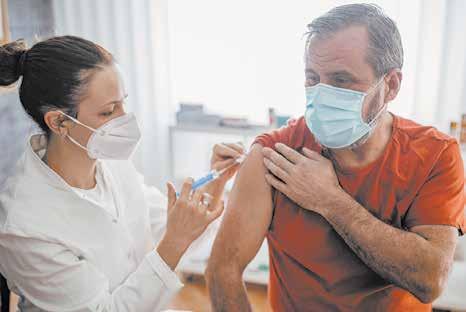
5 minute read
Vaccines Are Our Lifeline
We have had a very tough last 18 months. All of us have worked extremely hard, dealt with a huge amount of stress, and unfortunately, watched some of our co-workers get very sick and maybe even die. The personal stress that many of us have dealt with has been significant. Personally, I have sometimes woken up in the middle of night after coming home from a busy COVID emergency department with nightmares worried I had virus on me that I was going to give to wife and family. I know there are many other EMS workers and other healthcare providers who have been through much more than I have. We will get through this. The only way to
really make it end though is through vaccination. The COVID vaccines have been fully tested, they are safe and they are effective. We all need to get vaccinated to protect ourselves, our families, and our communities. There are many rumors and James Winslow incorrect information regarding the vaccines. Here are some answers to a few questions I have heard.
Advertisement
Have the Vaccines Been Fully Tested?
All the COVID vaccines currently being used in the United States have been fully tested and any adverse effects of the vaccines are being carefully monitored. We are not Russia or China where vaccines were approved without fully testing them. The Pfizer, Moderna, and Johnson and Johnson vaccines went through full Phase 3 testing which required at least 30,000 participants. Since then over 350 million doses have been given in the United States. We now know everything there is to now about any adverse effects of the vaccines and their effectiveness. These are safe vaccines. Any adverse effects of the vaccines are outweighed by their benefit.

Do the Vaccines Work?
The vaccines are very effective. A recent article published in the New England Journal of Medicine looked at the effectiveness of the Pfizer vaccine against symptomatic disease. It found that one dose of Pfizer vaccine provided about 30 percent protection against symptomatic disease and the full two dose regimen still provided 88 percent protection against symptomatic disease. Here is the link to that article: https:// www.nejm.org/doi/full/10.1056/ NEJMoa2108891?query=featured_ coronavirus
If you do get COVID after vaccination it is normally nothing more than a cold and the infection is not severe. A good illustration of this occurred at a recent COVID outbreak in Massachusetts. This took place at a resort community where 60,000 people came what was basically a big party. Among the people attending there was a 70 percent vaccination rate. Three hundred forty-six vaccinated people got COVID. Of the 346 vaccinated patients who got COVID only four were hospitalized and two of those patients had significant comorbidities. None died. Nationally we have seen that around 95 percent of COVID cases and all hospitalized patients with COVID were unvaccinated. Here is a link to Massachusetts data: https://www.cdc. gov/mmwr/volumes/70/wr/mm7031e2.htm

Do the Vaccines Make a Person Infertile?
The vaccines do not affect fertility. No vaccine has ever caused infertility. COVID infection is very dangerous for a pregnant woman. A pregnant woman with COVID is 22 times more likely to die than a non-infected pregnant woman. The baby is also more than two and one-half times more likely to have a bad outcome at birth including but not limited to intracranial hemorrhage, severe lung problems or hypoxic encephalopathy. There are many more severe complications that a COVID infection can cause for a pregnant woman. A really wonderful benefit of the vaccine is that it allows the mother to give protective antibodies to the newborn in her breast milk. The complete article can be found on the Journal of the American Medical Association website at this link: https://jamanetwork.com/journals/ jamapediatrics/fullarticle/2779182
There is also preliminary research showing a possible association between COVID infection and erectile dysfunction. One study found that after COVID infection men were more than five and onehalf times more likely to have erectile dysfunction. This could be due to general debilitation after the infection. It’s also possible that the
erectile dysfunction could be due to the fact that the COVID virus infects many of the small vessels in the body and the male erection is dependent on the health of these small vessels. Other studies also seem to show the virus persists in the penile tissue and may cause a drop in testosterone levels. Here is a link to an article for the study looking at the association between COVID infection and erectile dysfunction: https://pubmed.ncbi.nlm. nih.gov/33742540/
Why Do I Still Need to Wear a Mask?
The vaccines are good, and you are about three and one-half times less likely to get an infection if you are vaccinated. There are some theories that very large exposures to virus are more likely to result in breakthrough infections. Wearing a mask will help reduce the amount of virus you are exposed to which could help reduce the chance of developing a breakthrough infection. In addition, if you do develop a COVID infection after vaccination wearing a mask will greatly reduce the chance of infecting others.
What Are Most COVID Infections Like in People Who Are Vaccinated?
Dr. Chris Ohl, an infection disease specialist at Baptist Hospital in Winston-Salem, has used the term “covid cold” to describe COVID infections in people who have been vaccinated. Most people who develop COVID are exposed to the virus in their nose. The virus then begins to multiply in your nasal mucosa. After about two or three days the virus has multiplied enough in your nasal mucosa for your immune system to take notice. At this point you may develop a “COVID cold.” In vaccinated people the immune system is already primed and ready to attack the COVID virus. In most cases the immune system in a vaccinated person then rapidly wipes out the viral infection while you feel like you have nothing more than a cold. In a non-vaccinated person, the virus continues to multiply and spreads through your body. The immune system then takes too long to react before the virus takes hold.
Are There Certain People at Risk for Breakthrough Infections?
The people at greatest risk for serious breakthrough infections are people over age 65, transplant patients, cancer patients and people with other types of immunosuppression.
Dr. Winslow has worked at Baptist Hospital in Winston-Salem for the past 11 years. He was appointed as the Medical Director of the NC Office of EMS in 2011. This document contains all protocol, procedures, and policies for all EMS agencies in North Carolina.












